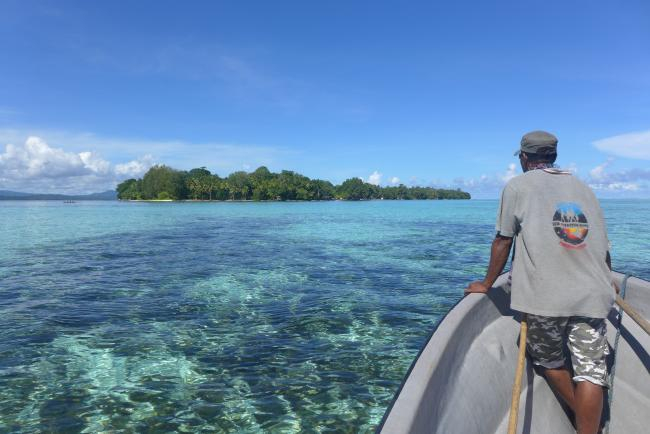27.05.2019 | Dr. Sebastian Ferse, coral reef ecologist at the Leibniz Centre for Tropical Marine Research (ZMT), recently took part in a panel discussion at the DEEPWAVE Film Festival in Hamburg, which attracted more than 200 visitors. Focussing on the beauty of the sea and oceans, but also on problems such as endangered corals, the ecological consequences of deep-sea mining, overfishing, oil and plastic pollution, Dr. Ferse discussed a variety of aspects together with Prof. Dr. Antje Boetius (AWI - Alfred Wegener Institute, Helmholtz Centre for Polar and Marine Research, Bremerhaven), Dr. Rolf Koppelmann (IMF - Institute for Marine Ecosystem and Fisheries Sciences, Hamburg) and Dr. Götz Reinicke (Stiftung Deutsches Meeresmuseum, Stralsund).
The debate was part of the DEEPWAVE Film Festival for the Protection of the Seas, which had been organised for the first time this year by the association of the same name. A selection of films from a total of 300 submissions from over 60 countries was screened. Thematically, the festival dealt not only with corals and their ecological and social significanceand their endangerment from acidification and climate change, but also threw a light on the deep sea – with previously unseen shots and documentaries on deep-sea research and ecological aspects of deep-sea mining.
A film about the BMBF project REPICORE produced at ZMT was also be shown at the festival receiving a great response from the audience. The filmmaker Tom Vierus, a former Master student at ZMT, shot the film in Melanesia together with Sebastian Ferse's working group.
About the film REPICORE - Research in Melanesia
For five years a team of scientists led by coral reef ecologist Dr. Sebastian Ferse as part of the REPICORE project investigated the resilience of social-ecological coral reef systems in Melanesia. The main focus was on the effects of global climate change as well as local human activities and social changes in the South Pacific. The scientists followed a transdisciplinary approach and worked closely with local residents, policy makers, civil society organisations and an international network of scientific partners. This 18-minute documentary provides insights into the research work and important results and accompanies the team on its final visit to the study region, during which the project results were discussed with local partners and villagers.
DEEPWAVE Film Festival for the Protection of the Seas
When: Friday, 24 May 2019
Admission: 17 o'clock
Start: 17:30 o'clock
End: 22:30 o'clock
Where: Lichtmess-Kino, Gaußstraße 25, 22765 Hamburg, Germany
Admission free!
https://www.deepwave.org/





